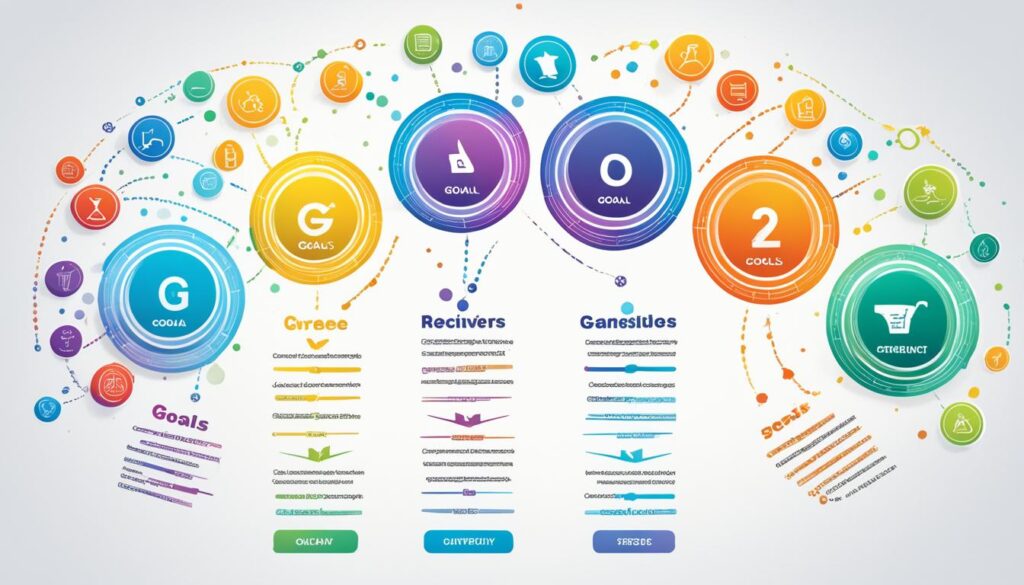Unlock Your Potential with Goal Categories

Have you ever wondered what types of goals can truly unlock your potential? Are you setting goals that empower you to reach new heights, or are you stuck in a rut, settling for mediocrity? It’s time to challenge your beliefs and explore a new approach to goal setting.
Setting goals is not just about jotting down your dreams and hoping for the best. It’s about categorizing your goals in a way that aligns with your aspirations, values, and desired outcomes. By understanding the different goal categories and how they can impact your journey, you can supercharge your progress and unlock your true potential.
Key Takeaways:
- Goal setting is a powerful tool for personal and professional development.
- Categorizing your goals provides focus and direction.
- Understanding different goal categories can help unlock your potential.
- Setting goals that align with your values leads to greater fulfillment.
- Don’t settle for mediocrity; challenge your beliefs and set goals that empower you to thrive.
The Importance of Goal Setting
Goal setting is a powerful tool that can greatly enhance your focus, motivation, and potential for success. By setting clear goals, you provide yourself with a roadmap towards achieving your desired outcomes. Whether it’s for personal, professional, financial, or lifestyle development, goal setting plays a crucial role in guiding your growth.
It all starts with self-reflection. Take the time to identify what you truly want to achieve. By understanding your aspirations, you can set goals that align with your values and passions. Remember, goals can come in different forms. You may have short-term goals that you aim to accomplish within a few days or weeks, or long-term goals that you’re working towards over several months or years. You might even have life goals that reflect your ultimate vision for the future.
There are numerous benefits to setting goals. One key advantage is improved focus and motivation. When you have a clear target in mind, it becomes easier to prioritize your time and energy. Goals help you eliminate distractions and stay dedicated to what truly matters. Moreover, setting goals increases self-awareness. It allows you to gain a deeper understanding of your strengths, weaknesses, and areas for improvement. This self-awareness is invaluable in guiding your personal and professional development.
Another benefit of goal setting is enhanced decision-making and problem-solving skills. When you have a concrete goal to work towards, you’re better equipped to make choices that align with your objectives. Additionally, goals push you to think creatively and find solutions to any obstacles you encounter along the way.
To ensure that your goals are effective and achievable, consider using the SMART framework. SMART stands for Specific, Measurable, Achievable, Relevant, and Time-bound. By setting goals that are specific and measurable, you provide yourself with clear targets to work towards. Ensuring that your goals are achievable and relevant helps maintain your motivation and ensures that they align with your overall vision. Finally, setting a timeline for your goals creates a sense of urgency and helps you stay focused on taking consistent action.

Remember, goal setting is a dynamic and ongoing process. As you progress and learn more about yourself, your goals may evolve. Be flexible and willing to adapt your goals as needed. Stay committed to the process, celebrate your achievements along the way, and don’t be afraid to make adjustments when necessary. By embracing the power of goal setting, you can unlock your full potential and achieve extraordinary results.
Creating a Goal Setting Plan
Creating a goal setting plan is the key to turning your dreams into actionable steps towards success. By breaking down your goals into smaller tasks, setting deadlines and reminders, tracking your progress, and celebrating your successes, you can stay motivated and focused on achieving your goals.
SMART goals are an effective framework for creating focused and effective goals. SMART stands for Specific, Measurable, Achievable, Relevant, and Time-bound. When setting SMART goals, be clear and specific about what you want to achieve, ensure that your goals are measurable so you can track your progress, set realistic and achievable targets, align your goals with your overall objectives, and assign a timeframe for completion.
Here is a list of strategies for achieving your goals:
- Break down your goals into smaller tasks: Breaking down your goals into smaller, actionable tasks makes them more achievable and less overwhelming. It allows you to focus on one step at a time, building momentum towards your ultimate goal.
- Set deadlines and reminders: Setting deadlines creates a sense of urgency and helps you stay on track. Use reminders, whether in a planner, calendar, or digital tool, to prompt you to complete tasks and meet deadlines.
- Track your progress: Regularly track your progress to stay accountable and motivated. You can use progress trackers, spreadsheets, or apps to visually see how far you’ve come and identify areas for improvement.
- Celebrate your successes: Celebrating your successes, no matter how small, boosts motivation and reinforces positive habits. Take time to acknowledge and reward yourself for reaching milestones along the way.
Staying Motivated and Focused
Staying motivated and focused on your goals is crucial for success. While the strategies mentioned above contribute to maintaining focus, finding an accountability partner can also provide additional support and encouragement.
An accountability partner can be a friend, family member, or colleague who shares the same dedication to achieving their goals. You can hold each other accountable by regularly checking in, sharing progress, and providing support when faced with challenges.
To overcome challenges and obstacles, try the following:
- Break down goals into smaller tasks: When facing a particularly challenging goal, breaking it down into smaller, manageable tasks can make it more approachable and less daunting.
- Take small steps: Take small, consistent steps towards your goals every day. Remember that progress is progress, no matter how small.
- Address obstacles: Identify and address any obstacles that may hinder your progress. Develop strategies to overcome these obstacles and stay focused on your goals.
- Find accountability partners: Surround yourself with people who support and encourage your goals. Engage in communities, join support groups, or seek professional assistance to find the accountability you need.
By creating a goal setting plan, staying motivated, and overcoming challenges along the way, you can set yourself up for success and achieve your goals.

Staying Motivated and Focused
When it comes to achieving your goals, staying motivated and focused is crucial. Fortunately, there are several effective strategies you can employ to maintain your drive and concentration throughout your journey. By implementing these strategies, you can overcome obstacles, stay on track, and ultimately reach your desired destination.
Break Down Goals into Smaller Tasks
One proven method for staying motivated and focused is to divide your goals into smaller, manageable tasks. This approach allows you to tackle each task with greater ease and provides a sense of accomplishment as you complete them one by one. By breaking down your goals, you prevent overwhelm and maintain a clear pathway to success.
Set Deadlines and Reminders
Setting deadlines and reminders is another effective way to stay motivated and focused. Assigning specific due dates for each task ensures that you maintain a sense of urgency and progress steadily toward your goals. Additionally, utilizing reminders, such as calendar alerts or mobile app notifications, helps keep your objectives at the forefront of your mind, reducing the likelihood of distractions or procrastination.
Track Progress and Celebrate Successes
Tracking your progress is essential for maintaining motivation and focus. Whether through a journal, spreadsheet, or progress-tracking app, regularly monitoring your achievements allows you to witness your growth and serves as a reminder of how far you’ve come. Additionally, remember to celebrate your successes along the way. Rewarding yourself for reaching milestones can boost your morale and provide the motivation needed to continue pushing forward.
Find an Accountability Partner
Having an accountability partner can significantly enhance your ability to stay motivated and focused. An accountability partner is someone who shares your goals and provides support, encouragement, and objective feedback. They can help keep you accountable by checking in on your progress, offering guidance when you face challenges, and celebrating your accomplishments together. Collaborating with an accountability partner adds an extra layer of commitment and motivation to your journey.
| Strategies for Staying Motivated and Focused |
|---|
| Break down goals into smaller tasks |
| Set deadlines and reminders |
| Track progress and celebrate successes |
| Find an accountability partner |
By implementing these strategies, you can maintain your motivation and focus throughout your goal pursuit. Remember, staying motivated and focused is a continuous process, and it requires dedication and perseverance. Embrace these strategies as powerful tools on your journey to success.
Conclusion
Unlocking your potential and achieving your dreams begins with setting goals and following the four guiding principles. Goal setting is not just a destination but a transformative journey that requires dedication, perseverance, and self-awareness. By embracing the process and committing to it wholeheartedly, you open the door to endless possibilities.
Throughout this journey, it is crucial to celebrate your successes, no matter how small they may seem. Each milestone reached is an affirmation of your progress and a testament to your determination. Remember to reflect on your achievements and use them as motivation to keep moving forward.
Moreover, as you navigate the path of goal achievement, take advantage of every opportunity to learn and grow. Each setback is an opportunity for self-improvement, and each challenge is a chance to discover your strengths. Embrace the lessons along the way and use them as stepping stones towards your ultimate vision.
Ultimately, unlocking your potential and achieving your goals is not about reaching a certain destination; it is about the person you become throughout the process. It is about harnessing your strengths, overcoming obstacles, and embracing your true potential. Trust in your abilities, stay committed to your goals, and let your determination guide you towards a future filled with purpose and fulfillment. Congratulations on embarking on this transformative journey of goal achievement!






